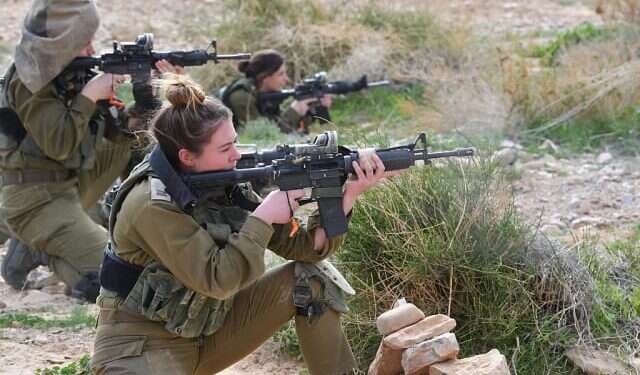Women are capable of serving in combat roles, there is no need for Orthodox male soldiers to have any physical contact with women, and women are not adversely affected by serving on a base with religious male soldiers, a new poll conducted by the Israel Institute for Democracy shows.
The poll, conducted on behalf of the IDI by Panels Ltd., polled 500 male and female soldiers who are currently serving in the IDF or recently completed their service about an IDF directive ordering women to be integrated into combat service and to what extent that directive causes friction with religious male soldiers.
Follow Israel Hayom on Facebook and Twitter
Despite the controversy sparked when the IDF issued the directive last year, 73.2% of respondents said that they had little or no knowledge of it, with 43.3% saying they had never heard of the directive at all. Only 15.8% of respondents said they were well-versed in the directive and had been briefed on it during their service.
Those who oppose integrating women into combat roles argue that it would harm the IDF's operational abilities, Soldiers, however, tended to disagree. Two-thirds (66.6%) of respondents said they disagreed that mixed-gender combat service was detrimental to operations, compared to 30.6% who said they disagreed. Nearly half (49.4%) said mixed-gender service posed no hardships to either gender, while 39.4% said that mixed-gender service made day-to-day life in the army more complicated.
The poll also questioned soldiers about tension created by women serving alongside religious soldiers: 77.8% of respondents said that religious soldiers in combat units were not required to carry out any actions that demanded physical contact with their female comrades, and another 66.4% said that they had not experienced incidents in which female soldiers were barred from any areas of bases because of the presence of religious male soldiers.
When asked if female soldiers were banned from wearing shorts or tank tops, 43.6% said that such cases happened infrequently or not at all, with 49.4% saying they had encountered such bans with varying frequency.
More than half (52%) of respondents said that their units addressed the needs of female soldiers and religious male soldiers equally, compared to 26% who said that more consideration was given to religious male soldiers. When asked about the overall situation in the IDF, 39% said that the two groups were treated equally, compared to 37% who thought that the army paid more attention to the demands of religious male soldiers than to those of female soldiers.
Dr. Idit Shafran Gittleman, a researcher with the Center for Security and Democracy at the IDI, said that the poll "indicates a need to inculcate the [mixed-gender] directive and implement it as stated. The data also shows that there are gaps in the positions of the two sides when it comes to gender equality, and these are expressed in a very broad interpretation of the directive, which leads [it] away from its principles."




